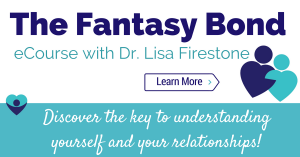Why Break Ups Hurt So Much
 When we feel absolutely devastated by a relationship coming to an end, we should ask ourselves a serious question: “What are we really losing?” Admittedly, one of the most painful things in life is loss, and losing contact with someone we love can be heartbreaking. However, many people decide to call it quits after months or even years of emotional estrangement and physical distance. Then, why is it that couples who rarely show affection or who barely relate often feel panicked at the loss of their partner? Or why is it that a person, who is on the verge of ending a relationship that they are unhappy in, feels desperate and abandoned when their partner chooses to end the relationship first?
When we feel absolutely devastated by a relationship coming to an end, we should ask ourselves a serious question: “What are we really losing?” Admittedly, one of the most painful things in life is loss, and losing contact with someone we love can be heartbreaking. However, many people decide to call it quits after months or even years of emotional estrangement and physical distance. Then, why is it that couples who rarely show affection or who barely relate often feel panicked at the loss of their partner? Or why is it that a person, who is on the verge of ending a relationship that they are unhappy in, feels desperate and abandoned when their partner chooses to end the relationship first?
The overwhelming, emotionally shattering sense of loss that we experience at the end of a relationship is often the result of our having created a “fantasy bond” with our partner. A fantasy bond is a term developed by my father, psychologist Robert Firestone, to describe an imagined connection a person develops to another person, thereby creating an illusion of security or false sense of safety.
When individuals do this, they no longer express genuine acts of love; instead they substitute real relating with the form of having a relationship and exist as two isolated people living two separate lives. A fantasy bond helps the people in a couple to feel that they are not alone, and yet, they are often emotionally distanced from one another.
 When we are in a fantasy bond, our actual relationship may have begun to erode long ago, when we started replacing real acts of kindness, respect and affection with deadening routines and defensiveness toward each other — when we gradually showed less and less physical affection or stopped expressing a personal interest in one another. Eventually, neither one of us is truly being ourselves. We are no longer vulnerable to our loved one. Thus, when we lose the relationship, what we are really losing is the false sense of security that the fantasy bond provided and not the intimacy that we once felt with our partner.
When we are in a fantasy bond, our actual relationship may have begun to erode long ago, when we started replacing real acts of kindness, respect and affection with deadening routines and defensiveness toward each other — when we gradually showed less and less physical affection or stopped expressing a personal interest in one another. Eventually, neither one of us is truly being ourselves. We are no longer vulnerable to our loved one. Thus, when we lose the relationship, what we are really losing is the false sense of security that the fantasy bond provided and not the intimacy that we once felt with our partner.
For example, a woman I knew decided to leave her husband. For years, there had been little exchanged between the two in terms of warmth, romance or even small acts of thoughtfulness. She felt strong in her decision and bright about her future. She was even excited at the possibility of finding love again. Her husband begged her not to leave and told her he couldn’t go on without her, so she decided to stay to try to work things out. For months, nothing changed between them, and soon enough, her husband decided he wanted a divorce. The woman was devastated. Having once felt solid about her own decision to leave, she now felt panicked and fell to pieces at the thought of being alone. She feared she wouldn’t be able to take care of herself, to even survive without him.
It took her some time, but the woman ultimately realized that it wasn’t her husband’s loss she was mourning; it was the illusion of security that the relationship provided. She had used her marriage to feel that she was living up to society’s expectations, to prove to that she was a desirable woman. When she planned to leave him, she felt stable and confident in herself. Yet, when he decided to leave her, she was overwhelmed by fears, insecurities and attacks on herself.
When we’re feeling devastated after a break up, it’s important to take a hard look at what might be creating this feeling. Is it the loss of the relationship or the fantasy? Were we really treating each other in a loving way? Were we really there for each other? Were we both showing care, honesty and respect for each other? Am I upset by the loss of actual relating or the fantasy that we substituted for real relating long ago? Am I indulging in self-critical thoughts that tell me that I’ll never find love or that there is something wrong with me?
When we feel rejected, we often start to listen to destructive “inner voices” that attack us and our partner. When we’re listening to these destructive thoughts, we’re more likely to feel humiliation than real sadness over our loss. Our inner critic fuels feelings of not being able to survive on our own, often saying that no one will ever love us. When these voices aren’t viciously attacking us, they are often raging at our partner, which only supports a victimized orientation to our situation. Our critical thoughts are rarely based on reality. They represent a vicious “anti-self” that is a negative way of seeing one’s self that is incorporated early in one’s life.
When a fantasy bond is broken, we are more likely to mourn the end of our false sense of security than the end of real, loving relating. The scene in the iconic film When Harry Met Sally captures this dynamic perfectly when a sobbing Sally calls her best friend Harry over to her apartment. Sally is distraught because a man she had seriously dated a while ago was now getting married to someone else. While Sally had never wanted to marry her ex and felt admittedly “fine” after their break up, the news that he was committing to someone else had her in hysterics.
Sally: All this time I thought he didn’t want to get married. But, the truth is, he didn’t want to marry me. He didn’t love me.
Harry: If you could take him back now, would you?
Sally: No. But why didn’t he want to marry me? What’s the matter with me?
When we break up with someone, and we are willing to let go of this illusion of connection, we might find that we are far less devastated by the separation. Instead, we can feel our real feelings of sadness or loss. However, we won’t feel as if we are losing ourselves. It’s important to remember that you are a whole person on your own. No person can complete you. You’re not losing your identity by losing your relationship. You may even be opening up a door to get to know yourself better.
Without the deadening restraints of a fantasy bond, we can discover who we really are and what we really want. We can develop our capacity to be loved and open ourselves up to staying close with someone who is available and kind to us. A relationship built on love, as opposed to fantasy, is far less likely to crumble overnight, because it is based on honesty and real relating. When we develop ourselves, we improve our chances of finding the type of relationship that keeps us feeling vital and is well worth fighting for.
Learn how to break free from a Fantasy Bond in our eCourse, The Fantasy Bond: The Key to Understanding Yourself and Your Relationships
Tags: break-up, breaking up, failed relationships, fantasy bond, love









Dear ph.d Lisa . I could take more information from your topic . Thanks for all !
Beautifully said.
I’d like to add that these fantasy bond restraints and breakups you describe also apply to friends and family members.
Thank you for this much needed perspective.
Joanna Poppink, MFT
Los Angeles psychotherapist
author of Healing Your Hungry Heart: recovering from your eating disorder.
where have YOU been all my life! Just reading the titles of your publications makes me happy to have ‘found’ you; I foresee lots of wonderful reading, learning, and growing. Even though I’m an “old dog”, I intend to learn lots of “new tricks” LOL, thanks..
truly a beautiful writer and a beautiful woman thanks for the information.
“What’s wrong with me?” hit me like a brick when my girlfriend broke up with me. I even asked her that very question. She assured me “nothing” was wrong with me. But the entrenched demon remained. Therapy and lots of yoga made a real difference. That core belief remains but is a symptom managed. “Fantasy Bond” made great sense to me. It describes perfectly my state of mind within the relationship.
It’s funny to me how i’ve used this concept for years in my own work as a therapist, and yet forgot to apply it to my own circumstances. I fell in love with potential and am now trying to extricate myself from exactly the difficulties you describe above–i was told by my alcoholic husband that his drinking wasn’t the problem, and that rather than me leaving because of that, I needed to leave because he no longer loved me as much as he once did. Brilliant turnaround for him–absolutely devastated me. Thank you for the article–it has helped me get back into my own therapy and back on track. Can’t see the forest…..:)
I love this article, and I love your father’s book. Many many ‘aha’ moments about relationship, relating and one’s own issues in there!
Thank you for sharing.